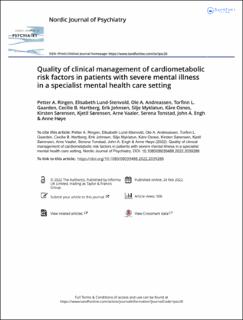| dc.contributor.author | Ringen, Petter Andreas | |
| dc.contributor.author | Lund-Stenvold, Elisabeth Haug | |
| dc.contributor.author | Andreassen, Ole | |
| dc.contributor.author | Gaarden, Torfinn Lødøen | |
| dc.contributor.author | Hartberg, Cecilie Bhandari | |
| dc.contributor.author | Johnsen, Erik | |
| dc.contributor.author | Myklatun, Silje | |
| dc.contributor.author | Osnes, Kåre | |
| dc.contributor.author | Sørensen, Kirsten | |
| dc.contributor.author | Sørensen, Kjetil | |
| dc.contributor.author | Vaaler, Arne | |
| dc.contributor.author | Tonstad, Serena | |
| dc.contributor.author | Engh, John | |
| dc.contributor.author | Høye, Anne | |
| dc.date.accessioned | 2022-06-03T11:21:49Z | |
| dc.date.available | 2022-06-03T11:21:49Z | |
| dc.date.created | 2022-03-07T12:46:10Z | |
| dc.date.issued | 2022 | |
| dc.identifier.issn | 0803-9488 | |
| dc.identifier.uri | https://hdl.handle.net/11250/2997505 | |
| dc.description.abstract | Purpose
Cardiometabolic disease in patients with severe mental illness is a major cause of shortened life expectancy. There is sparse evidence of real-world clinical risk prevention practice. We investigated levels of assessments of cardiometabolic risk factors and risk management interventions in patients with severe mental illness in the Norwegian mental health service according to an acknowledged international standard.
Methods
We collected data from 264 patients residing in six country-wide health trusts for: (a) assessments of cardiometabolic risk and (b) assessments of levels of risk reducing interventions. Logistic regressions were employed to investigate associations between risk and interventions.
Results
Complete assessments of all cardiometabolic risk variables were performed in 50% of the participants and 88% thereof had risk levels requiring intervention according to the standard. Smoking cessation advice was provided to 45% of daily smokers and 4% were referred to an intervention program. Obesity was identified in 62% and was associated with lifestyle interventions. Reassessment of psychotropic medication was done in 28% of the obese patients. Women with obesity were less likely to receive dietary advice, and use of clozapine or olanzapine reduced the chances for patients with obesity of getting weight reducing interventions.
Conclusions
Nearly nine out of the ten participants were identified as being at cardiometabolic high risk and only half of the participants were adequately screened. Women with obesity and patients using antipsychotics with higher levels of cardiometabolic side effects had fewer adequate interventions. The findings underscore the need for standardized recommendations for identification and provision of cardiometabolic risk reducing interventions in all patients with severe mental illness. | en_US |
| dc.language.iso | eng | en_US |
| dc.publisher | Taylor & Francis | en_US |
| dc.rights | Attribution-NonCommercial-NoDerivatives 4.0 Internasjonal | * |
| dc.rights.uri | http://creativecommons.org/licenses/by-nc-nd/4.0/deed.no | * |
| dc.title | Quality of clinical management of cardiometabolic risk factors in patients with severe mental illness in a specialist mental health care setting | en_US |
| dc.type | Journal article | en_US |
| dc.type | Peer reviewed | en_US |
| dc.description.version | publishedVersion | en_US |
| dc.rights.holder | © 2022 The Author(s). | en_US |
| cristin.ispublished | true | |
| cristin.fulltext | original | |
| cristin.qualitycode | 1 | |
| dc.identifier.doi | 10.1080/08039488.2022.2039288 | |
| dc.identifier.cristin | 2008033 | |
| dc.source.journal | Nordic Journal of Psychiatry | en_US |
| dc.identifier.citation | Nordic Journal of Psychiatry. 2022. | en_US |

